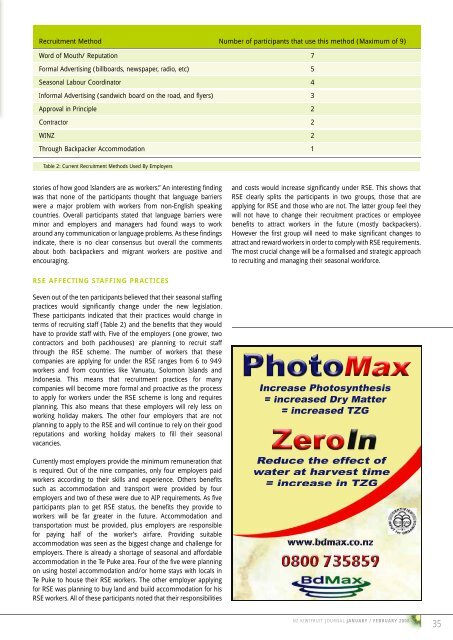Thirsty vines Summer girdling Compost teas Organic marketing The ...
Thirsty vines Summer girdling Compost teas Organic marketing The ...
Thirsty vines Summer girdling Compost teas Organic marketing The ...
You also want an ePaper? Increase the reach of your titles
YUMPU automatically turns print PDFs into web optimized ePapers that Google loves.
Recruitment Method Number of participants that use this method (Maximum of 9)<br />
Word of Mouth/ Reputation 7<br />
Formal Advertising (billboards, newspaper, radio, etc) 5<br />
Seasonal Labour Coordinator 4<br />
Informal Advertising (sandwich board on the road, and fl yers) 3<br />
Approval in Principle 2<br />
Contractor 2<br />
WINZ 2<br />
Through Backpacker Accommodation 1<br />
Table 2: Current Recruitment Methods Used By Employers<br />
stories of how good Islanders are as workers.” An interesting fi nding<br />
was that none of the participants thought that language barriers<br />
were a major problem with workers from non-English speaking<br />
countries. Overall participants stated that language barriers were<br />
minor and employers and managers had found ways to work<br />
around any communication or language problems. As these fi ndings<br />
indicate, there is no clear consensus but overall the comments<br />
about both backpackers and migrant workers are positive and<br />
encouraging.<br />
RSE AFFECTING STAFFING PRACTICES<br />
Seven out of the ten participants believed that their seasonal staffi ng<br />
practices would signifi cantly change under the new legislation.<br />
<strong>The</strong>se participants indicated that their practices would change in<br />
terms of recruiting staff (Table 2) and the benefi ts that they would<br />
have to provide staff with. Five of the employers (one grower, two<br />
contractors and both packhouses) are planning to recruit staff<br />
through the RSE scheme. <strong>The</strong> number of workers that these<br />
companies are applying for under the RSE ranges from 6 to 949<br />
workers and from countries like Vanuatu, Solomon Islands and<br />
Indonesia. This means that recruitment practices for many<br />
companies will become more formal and proactive as the process<br />
to apply for workers under the RSE scheme is long and requires<br />
planning. This also means that these employers will rely less on<br />
working holiday makers. <strong>The</strong> other four employers that are not<br />
planning to apply to the RSE and will continue to rely on their good<br />
reputations and working holiday makers to fi ll their seasonal<br />
vacancies.<br />
Currently most employers provide the minimum remuneration that<br />
is required. Out of the nine companies, only four employers paid<br />
workers according to their skills and experience. Others benefi ts<br />
such as accommodation and transport were provided by four<br />
employers and two of these were due to AIP requirements. As fi ve<br />
participants plan to get RSE status, the benefi ts they provide to<br />
workers will be far greater in the future. Accommodation and<br />
transportation must be provided, plus employers are responsible<br />
for paying half of the worker’s airfare. Providing suitable<br />
accommodation was seen as the biggest change and challenge for<br />
employers. <strong>The</strong>re is already a shortage of seasonal and affordable<br />
accommodation in the Te Puke area. Four of the fi ve were planning<br />
on using hostel accommodation and/or home stays with locals in<br />
Te Puke to house their RSE workers. <strong>The</strong> other employer applying<br />
for RSE was planning to buy land and build accommodation for his<br />
RSE workers. All of these participants noted that their responsibilities<br />
and costs would increase signifi cantly under RSE. This shows that<br />
RSE clearly splits the participants in two groups, those that are<br />
applying for RSE and those who are not. <strong>The</strong> latter group feel they<br />
will not have to change their recruitment practices or employee<br />
benefi ts to attract workers in the future (mostly backpackers).<br />
However the fi rst group will need to make signifi cant changes to<br />
attract and reward workers in order to comply with RSE requirements.<br />
<strong>The</strong> most crucial change will be a formalised and strategic approach<br />
to recruiting and managing their seasonal workforce.<br />
NZ KIWIFRUIT JOURNAL JANUARY / FEBRUARY 2008<br />
35


